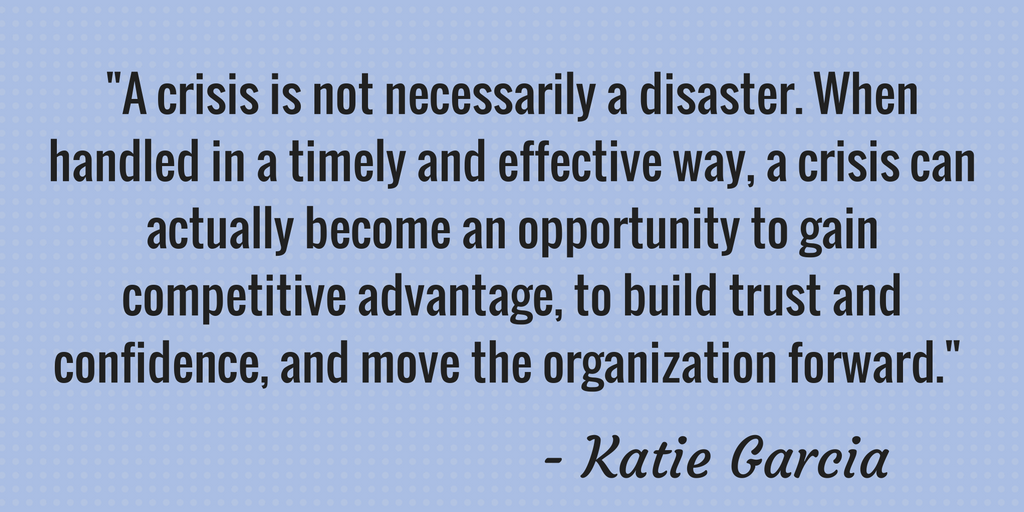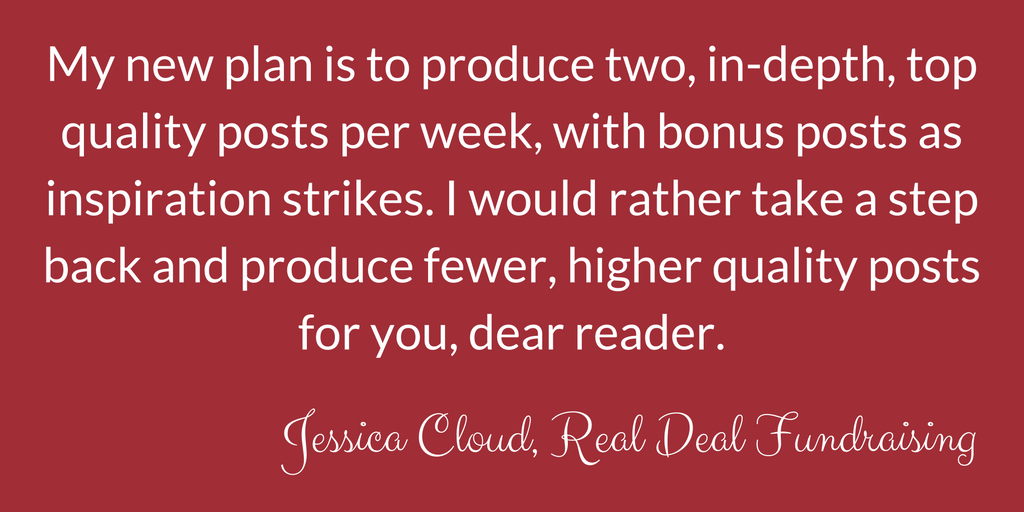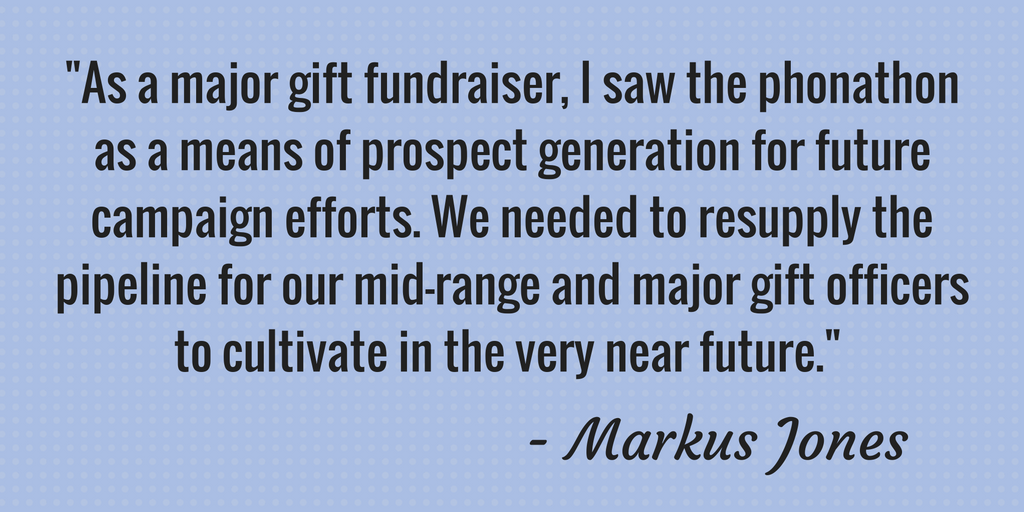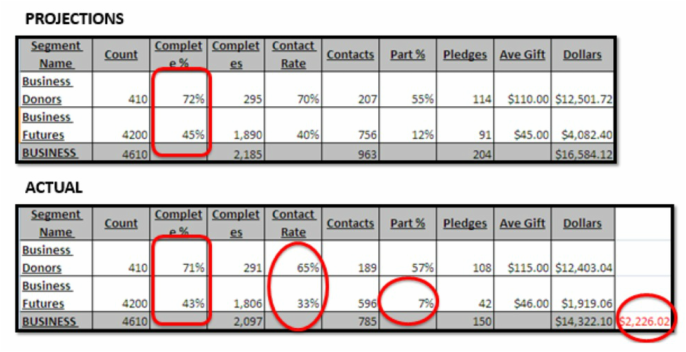|
It's Halloween! In honor of this cringe-worthy holiday, I thought I would share with you some of the most horrifying moments that I have been part of in fundraising. These are worse than any ghost story. Prepared to be spooked.
Privacy, please! The first story is definitely my worst miscalculation in fundraising. My first fundraising job was with the Libertarian National Committee in Washington, DC (otherwise known as the headquarters of the Libertarian Party, the 3rd largest political party in the United States) and I managed the transition of the LNC from a custom database that they had outgrown to Raiser's Edge. I was so over-excited by the analytical possibilities of this database (at the tender age of 24 years old) that I convinced the leadership that we needed to do a big data survey of our membership to raise money and optimize the database. It turned out to be such a colossally bad idea that I have no clue how I convinced all of my superiors to do this. You see, libertarians are some of the most privacy oriented people around. Privacy is almost a spiritual issue with this group. As soon as those surveys hit the mailboxes, we began getting calls, emails and all manners of very vocal complaints. It went on for weeks. It was a classic case of 1) getting too enamored with technology over people, 2) not fully understanding the character of your constituents, and 3) leadership not stepping in to stop a bad idea. Ah, well, you live and you certainly learn. If the shoe doesn't fit At both the University of South Carolina and the University of Southern Mississippi, I have seen success with a mailer/phone call campaign that rotates alumni off of the school's Do Not Contact list after a certain period of time. You see, at large public schools, many alumni don't know that or how they got put on the list and sometime phonathon callers put folks on the list unnecessarily. Over the years, that adds up and locks too many prospects away without need. I talked about this campaign method at a conference I taught for annual giving officers and a former colleague of mine adapted it for the school she worked for, which was a small, private liberal arts college with an activist character. I felt terrible for putting her onto the method, because she called me later and let me know that it was a huge controversy and it was even on the front page of the school newspaper. Eeeekkkk!! The worst meat pies in Mississippi I remember the meeting clearly. We were planning our lifetime donor club Gala event. It was our first big event after an EF-4 tornado tore through our campus. There was a great story with our School of Music because they had been rehearsing the musical for that year, Sweeney Todd, when the storm hit their building. The students and faculty were lucky to survive. But the show went on to become a smash hit! Stephen Sondheim actually sent a gift with a hand-written note. Great story! So, my VP announces that the cast will be performing numbers from the show at the Gala. I raised my hand. "Um...do you all know what Sweeney Todd is about?" "Sure, it's about a crazy barber." "No, it's about cannibalism." (Pulls up the song, The Worst Meat Pies in London and A Little Priest and I play them on my phone) "Oh, surely, they won't select those." (I cross my arms and say, "we'll see.") The night of the Gala, with $75 per plate filet mignon steaks in front of our top donors, the cast did in fact sing both of those songs. And there were gentleman and ladies in lovely dresses with green faces leaving the ballroom. "Have a little priest?" What is that? It's fop Finest in the shop And we have some shepherd's pie peppered With actual shepherd on top The moral of these stories The takeaway from these stories is to "Honor Thy Constituency" without becoming paralyzed by fear. If you stop doing innovative things, you'll never raise the money your institution needs. But, you must be careful to monitor the details and make sure the overall concept matches the character of the constituency you serve.  his week's Thursday feature is an interview with Katie Garcia, the founder and president of Athene Strategies, a strategic and crisis communications consulting firm. I asked Katie a series of questions about an important topic for any fundraiser, how to communicate with your constituents during an organizational crisis. 1) When a non-profit organization finds that it is in the midst of a crisis, what is the first steps that the staff should take? The first step that an organization needs to make when in a crisis is to recognize that a crisis is occurring. When people think of crises, often times they think of the effects of poorly handled crises – they think of organization disasters. But a crisis is not necessarily a disaster. A crisis is a time when an organization is unable to operate normally. When handled poorly, a crisis can lead to a loss of trust and confidence in those who matter most and cause reputational harm. But when handled in a timely and effective way, a crisis can actually become an opportunity to gain competitive advantage, to build trust and confidence, and move the organization forward in achieving its goals. So the first step is to recognize when an organization is or will soon not operating normally. The second step is to clearly identify what the crisis is. Crises are organizational problems, not simply communication problems. Communication in and of itself is not enough to end a crisis. (Communication can exacerbate a crisis or organizational problem though). If you do not identify where the actual problem lies, you will not be able to respond in a way that will effectively end the crisis. Therefore, you need to clearly identify what the organizational problem is before you respond to the crisis. The third step is to decide how to respond to the crisis by asking and answering the following question: What would reasonable people appropriately expect a responsible organization to do when faced with this? This question is important. It is not asking what it is that an organization wants to say. That is self-indulgent. And while it might make an organization feel good, it will not move those who matter most to continue to support with the organization. Rather, the right question focuses on what the people who matter most – an organization’s stakeholders – would reasonably expect a responsible organization to do. And if an organization asks and answers this question, and then responds based on that answer in a timely way, an organization can end the crisis, increase trust and confidence in the organization, and get back to operating normally. 2) Is there any difference in how you handle a controversy versus a crisis with respect to communication? A controversy may or may not become a crisis. A controversy is a matter of public dispute, debate or disagreement. If a controversy gets to the point where the organization can no longer operate normally, then the response would be the same as for a crisis—to ask and answer the question: What would reasonable people appropriate expect a responsible organization to do when faced with this? And depending on what the crisis is, the response will differ based on the answer to that question. But the process is the same as with every crisis. However, a controversy may not become a crisis. For example, in a university setting, a dispute over hiring a professor because of their identity or a change in a tuition model are not crises. In that case, a controversy could be an opportunity to showcase the mission, values, and work of the organization in a way that reaches a larger audience than the organization would otherwise be able to reach. But to do that effectively, an organization would need to think strategically about 1) what it wants to achieve; 2) who the organization needs to reach to achieve that goal; and 3) what the organization wants that audience to think, feel, know or do in order to help achieve that goal. 3) What's your advice for fundraising during a crisis? Fundraising during a crisis needs approached in a strategic way. Whether or not and how to fundraise during a crisis will depend on what the crisis is and how the organization is responding to it. Sometimes, it may not be appropriate to fundraise during the crisis itself. For example, if the crisis revolves around an accusation that leadership have unethically or illegally handled their organization’s finances, fundraising before the crisis is resolved may not be appropriate and can actually exacerbate the crisis. Other times fundraising could be part of or support the crisis response. For example, if there is a natural disaster that affects those an organization serves or where the organization operates from, it could be that the organization fundraises specifically to address that need. When figuring out if and how to fundraise during a crisis, it will go back to the question of: What would reasonable people appropriately expect a responsible organization to do when faced with this? Fundraising during a crisis should be done in ways that are consistent with or in support of the crisis response and are appropriate given the circumstances of the crisis. 4) What are the best signs that the crisis is over? The key indication that a crisis is over is that the organization goes back to operating normally. If the crisis is handled well, that moment could happen right after the initial response. If an organization responds effectively right at the beginning, then the crisis may end before it really begins. The best handled crises are the ones that no one, outside the response team, knows about or noticed. But if the crisis is not handled well or in a timely enough way, or if the response involves some sort of shift within the organization – whether it be in personnel, leadership, or processes – it will likely take more time to get back to operating normally. And normal operations after the crisis may be different than what it was before the crisis. 5) What are your 3 favorite tips for handling the communication during a crisis? 1.) Take a deep breath and a step back. It is difficult when an organization you have devoted yourself to is in crisis. As human beings, it is in our nature to respond emotionally first when faced with a crisis. Whether it be with anger, confusion, sadness, panic, disbelief, denial – whatever you may be feeling, take a deep breath. And then another one. Find a way to stay calm. You will not be able to think clearly or respond effectively if you become consumed in your own feelings about what is happening. And then take a step back. Look objectively at the situation. See the whole board. Only then will you be prepared to respond to the crisis. 2.) Remember that leadership is not about you, it’s about who you serve. Leaders are charged with making decisions for the good of the organization. Sometimes that means doing or saying things that you may not be comfortable with or may not want to say or do. During a crisis, it is only too easy to get stuck in focusing or making decisions based on what you want to do, rather than what you need to do to fulfill the reasonable expectations of those who matter most to the organization. Remember when responding to a crisis that it is not about you or what you want – it is about your stakeholders. Leaders need to overcome the fear and inertia that leads to inaction in order to respond in timely and effective ways. 3.) Learn from past experience. We need to learn from past experience, both your own experience and the experience of others. In terms of crises, we can open any newspaper or watch any news program to witness what other organizations in crisis have done – decisions that either led to a crisis or decisions in how the organization responded to a crisis. Learn from these examples. They can guide you and organization as you answer that question of what reasonable people would appropriately expect a responsible organization to do when faced with this. What works for one organization may not work for another, but you can learn from other organizations. And in your own life, learn from your own experiences of facing crises. Learn from past crises in your life and the organization. What worked? What didn’t work? What could you or the organization have done differently? Let those past examples also guide you as you encounter crises or potential crises in your organization so that you can respond in timely and effective ways. More about Katie Garcia: Katie Garcia is the founder and president of Athene Strategies, a strategic and crisis communications consulting firm. For more than 10 years, Ms. Garcia has worked in the field of strategic and crisis communication and leadership development. During this time, she has advised leaders and organizations across multiple sectors including non-profits, international and national NGOs, religious institutions, educational institutions, political action campaigns, inter-governmental organizations, and small businesses. Ms. Garcia has trained and advised leaders and emerging leaders across sectors to improve their ability to communicate effectively in their positions of leadership. Prior to founding her firm, she served as Interim Communication Consultant for the Starr King School for the Ministry and Communications Consultant for Religions for Peace. She has also worked in organizations such as Freedom to Marry, Disaster Chaplaincy Services, and Logos Consulting Group. Hi! It's Jessica. I draw on the concepts that Katie presents in this article in my webinar presentation titled Fundraising in a Crisis. This webinar will launch Wednesday 3/18/20 for free as a resource for nonprofits to respond to the COVID-19 crisis. You can register here: www.realdealfundraising.com/crisiswebinar.  I've been having so much fun writing about fundraising since I started Real Deal Fundraising this past June. I set an ambitious goal of posting 5 original blog entries per week. By and large, I have managed to keep up the pace and it's been good for my writing and my career. But, as those of you in higher education fundraising especially know, fall is a very busy time. I am in a very small shop and the institution I work for has very real and immediate needs. And I am now traveling 1-2 weeks per month. To do justice to this blog, my day job, my family and my sanity, I am going to retool my goals for original posts. My new plan is to produce two, in-depth top quality posts about fundraising and career motivation/productivity per week, with occasional bonus posts as inspiration strikes. I would rather take a step back and produce fewer, higher quality posts for you, dear reader than churn out shorter posts and then have to miss a week if I get behind. When things slow down a bit, I want to utilize that extra time to produce more training products and e-books to help young fundraising professionals progress in their careers. So, I hope you will continue to visit and read the new content, as I have some things lined up that will be pretty exciting. Starting with tomorrow, when you'll be able to read an interview with an expert communications consultant about how to fundraise during an organizational crisis. Thank you for your continued support! Jessica Cloud I know it's so superficial and perhaps shallow.
But nonetheless, it's true. One of the reasons that I love being a fundraiser is the FOOD. It's no secret to anyone in the industry that we fundraisers love to eat. We like to take donors to dinner, to lunch, to have breakfast, to have coffee, or to meet for dessert. We like to do anything that will help us break bread with people because it is such a primal way to build relationships. It's a core aspect of hospitality to provide food to someone we are grateful for. And it is just a nice perk of the position. Fundraising is tough work and you get told no an awful lot, so getting a yummy meal brings balance to the universe. And inevitably as a fundraiser, you'll end up involved in event planning. Attending a tasting session for an important event is so much fun. I hope for each of you that one day you have enough positive career karma to get to sample delicious menus including desserts and wine. It's bliss. Truly. Despite the fact that it's a superficial reason to love my career, the food is some small compensation for having to ask people to share their hard-earned funds with our organizations. Bon appetit! I love TED talks. They are so great to watch on a lunch break or between meetings and learn something important in a short time. So, I thought it would be fun for FUNdraising Fridays to curate some of my favorite TED Talks for fundraisers. My first pick is this inspirational talk from Nancy Duarte. She demonstrates that the most famous speeches share a common structure that serves to set audiences on fire for your cause. One reason that I love this TED talk is because Nancy is a distinguished alumna of my alma mater, The University of Southern Mississippi School of Mass Communication and Journalism. Southern Miss to the Top! The content Nancy discusses in this talk applies to fundraisers because the formula she uncovered balances inspiration and current reality. It's therefore super-useful when you're making when you're making your pitch to donors and building your case for giving. So, in less than 20 minutes, Nancy will help you to improve your public speaking and storytelling skills, so that you can put together compelling proposals for your constituents. And of course, if you found this content helpful, please subscribe so you don't miss a single post from Real Deal Fundraising.
 This week's Thursday feature is an interview with Markus Jones, Senior Vice President for Development of the Sigma Nu Educational Foundation. His organization launched their first ever phonathon last year and I asked him some questions about the process and what the results have been for his organization.
Phonathon fundraising represented a method of communication that I felt our organization had not fully explored in the past. Likewise, it offered a unique opportunity to reach non-donors, friends and parents of our members, whom we had never previously contacted. As a major gift fundraiser, I also saw the Phonathon as a means of prospect generation for future campaign efforts. We needed to resupply the pipeline for our mid-range and major gift officers to cultivate in the very near future. We have been very carefully referring outliers from this effort to those gift officers.
Additionally, we were met with similar concerns from other members of the staff who are not directly involved with the fundraising operations. I worked with our communications team and other fundraising staff to develop internal communications that addressed their concerns in advance of launching the campaign. We shared FAQs, details about database segments, call schedules, and sample call scripts with everyone on staff prior to making calls. We also invited them to actively engage with donors who may have questions or concerns along the way. After the first week of calling, we distributed “canned responses” to commonly heard objections to the staff assigned to the front desk at the Fraternity Headquarters. We also created a page on our website dedicated to the Phonathon which carefully identified the company we contracted to conduct the calls, constituents who would receive the calls, why we were calling, and the timeframe in which calls would be made. This also helped to mitigate some push-back we received from outside constituents and, I believe, added some validity to the callers’ efforts.
Side note: Our vendor employs a very diverse group of callers and actually worked with us to recruit collegiate members from one of our Sigma Nu chapters near the call center. The feedback from the callers was also really great. They all enjoyed working on the campaign and speaking with our alumni on the phone. This was very encouraging for future partnerships.
More about Markus Jones: Prior to joining the staff of the Sigma Nu Educational Foundation, Markus served as a Development Officer at the University of Southern Mississippi Foundation. He began his career in nonprofit development and volunteer management following Hurricane Katrina as the Director of Marketing and Resource Development for the United Way of South Mississippi in Gulfport, MS. Markus has worked in the nonprofit development field for his entire professional career and strives to continue this path in the future. He holds a bachelor's degree in Advertising from The University of Southern Mississippi and in his spare time Markus enjoys books, the outdoors, volunteering and traveling. ast week, I argued that predictive modeling is not as intimidating as it sounds. In fact, you don't need a consultant to build your models and you are the best person to do it.
You are the best person to build your projections for a couple of reasons: 1) You do/should have the most knowledge about how your program has historically performed and your strategies going forward. 2) You will be the person working with those projections throughout the fundraising year as living documents to guide your path to optimum performance. To work best with the predictive model, you should build it and understand it from the ground up. A great report (if you can easily get it) is a projections versus actual report that shows you segment-by-segment, side-by-side, where you thought you would be and where you are currently. But if you can't get a report like this designed, no worries. You can easily have your projections (your predictive model) in one hand and your up-to-date actual results in another. You should do a P v. A (Projections versus Actual) analysis at least quarterly but ideally monthly. My recommendation would be to work up to more frequent analysis if you aren't currently doing it, as it can be overwhelming and time-consuming in the beginning. The benefits are abundant, though, as I will articulate. Here's how this works on the segment level: I'll use phonathon segments as an example, but this could be anything (direct mail, email, leadership giving, etc.) Say you are getting close to finished with the College of Business but it doesn’t look like you are going to reach your total dollars. You can now use your projections to pinpoint where the downturn occurred and proposed pointed solutions. (See charts above.) You notice that you are very close to finished (completion rate) and therefore you aren't going to have that many more calls in order to make up lost ground. The next thing that pops out to you is that contact rate didn't perform to expectations. This signals one major thing: lack of data integrity. Lastly, the participation rate for this group is much lower than projected. You have isolated the two major issues with the College of Business results thus far. If you never had the projections, your report to the Dean of the College of Business would probably simply be, "I'm sorry but we are going to fall short this year." Or worse, you might feel the need to follow that up with a bunch of speculations and excuses. Instead, you are armed with information and can break bad news with prepared data-driven solutions. So, a conversation with the Dean of the College of Business might go like this: “It appears that we may fall about $2,000 short of our goal for your college. This is due in part to our contact rate being lower than expected for the college overall and a slightly lower participation rate than we hoped for in the future donors. So, I would recommend that we send out a 'where are you?' email to try and get updated phone numbers for all of your graduates and we may lower the ask amounts for the future donors to help improve acquisition for this group.” This works the same way with your higher-ups. You will be able to show which metrics and schools are under-performing and explain the statistics rather than provide anecdotes or excuses. It works the exact same way if your results are amazing! You are able to report on where and how you beat the goal and therefore where the areas of opportunity are for the future. This perspective can change the course of your career because you will become the most trusted person in your organization. You are informed, realistic, and have solutions and analysis galore! Try this with your next project. Let me know how it goes. Make a practice to remember the little details you hear in conversation with donors, even if it seems irrelevant to fundraising. I promise, it matters. I'm not talking about remembering what their career is or how many kids they have. Those details are not irrelevant. These details impact your work directly.
Here's an example of what might have otherwise passed me by. I had a casual conversation with a board member and we talked about how his wife is into weaving. Although that's not a hobby of mine and has nothing what-so-ever to do with the mission of the organization we both serve, I made a mental note. At a national convention associated with our organization, I was talking with another donor to told me that she wove one of the tapestries that hang in the school. A light bulb went off! Since the board member was East Coast and this donor was West Coast it was unlikely they had me beforet. I introduced that donor to the wife of the board member at our Gala and they talked most of the night. The donor is a graduate and the board member of course is intimately connected to our school right now, so the fact that they met and bonded over weaving as a mutual hobby ultimately strengthen their connections to the school. Similarly, when you email a donor and get an out-of-office message, read it. If it says they are traveling to Europe, inquire about how their trip was when you follow back up. (You did put a calendar items in to follow up with them a few days after their out-of-office message says that they'll be back right?) Long-story-short, remembering the little details that don't seem at all connected to your goal (raising funds) will show your donor that you care enough about them as a person to pay serious attention. And it gives you the raw material to make connections and introductions that will be meaningful to your donors. When I was a young call center manager, I thought I would end up being a faculty member at a university. That was my career goal. I was totally opposed to making fundraising into a career rather than a job.
Then, one night I decided to mess with my callers just a bit. I had a cubicle in the corner of the call center. I shouted over the wall at around 8:00 PM that I had moved them ALL into credit card calling pools. Of course, since everyone they were talking with had both given before and given via credit card, they were excited. Sure enough, gifts picked up and in that last hour, the credit card rates were over 70%! The secret was that I hadn't done anything at all, except changed their expectations. At this point, I realized that I really liked the strategy and psychology in this field. I liked examining results and figuring out where things worked or didn't work and why. As I grew in my career, I loved the organizational challenges thrown at me. You have to have a strategy when you are trying to clean up a building project where naming opportunities might have been double-booked. Most of all, monitoring my own mindset is part of the strategy that keeps my mind stimulated. Smile when you dial is one of the most important lessons I ever learned. I never do the same thing day-to-day and there always a new challenge on the horizon, requiring a fresh strategy. If you are interested in the other reasons that I love being a fundraiser, check the posts out:
The importance of not taking yourself (and your job) too seriously cannot be overstated. If you don't laugh about what we are called to do, you will burn out. Repeat: You will burn out. One of my favorite ways to motivate the staff and get everyone giggling was to take popular memes and make them specific to whatever was the big project for our office at the time. When we launched our first day of giving campaign, the Southern Miss Gold Rush, I did a series of these that were just for us in the office. One is above. Here are a few more. These memes worked because in the back of everyone's mind when you launch a new project is "How much extra work is this going to cause me?" Right? So, let's make fun of that together and it makes it easier to get through the day. At the very least, everyone can laugh at me for sharing such silly memes via office email.
We loved Grumpy Cat at my last office because our Vice President for Advancement was notoriously for his pessimism, earning him the title of Grumpy Cat. We even got him a cake on his birthday! Epic!! So, lighten up and make your colleagues laugh a little. Otherwise you might end up with a birthday cake like this! |
Jessica Cloud, CFREI've been called the Tasmanian Devil of fundraising and I'm here to talk shop with you. Archives
June 2024
Categories
All
|













 RSS Feed
RSS Feed
